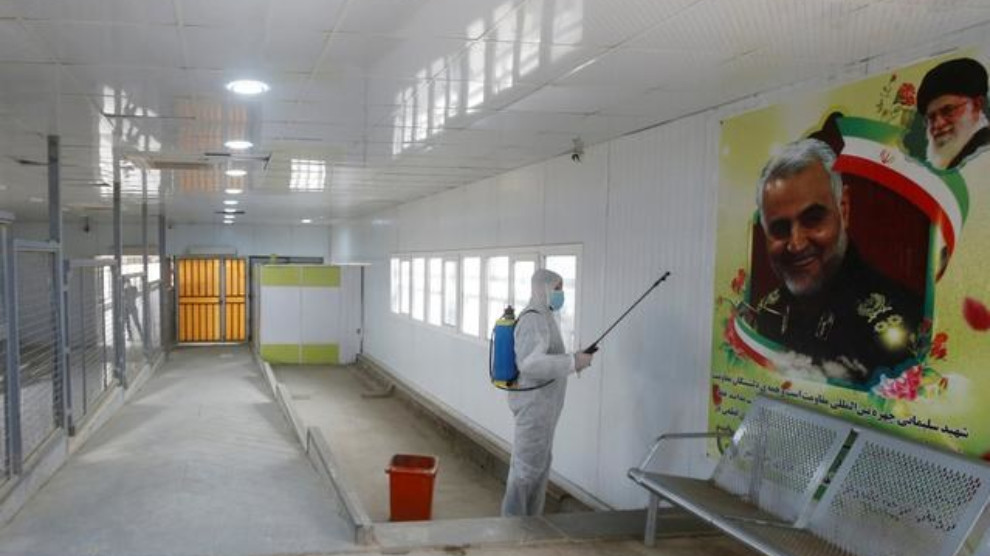Leaked letters reveal Iran’s denial of COVID-19 crisis in prisons
Amnesty International has received distressing reports of prisoners displaying COVID-19 symptoms being neglected for days.
Amnesty International has received distressing reports of prisoners displaying COVID-19 symptoms being neglected for days.

Leaked official letters newly obtained by Amnesty International reveal that the Iranian government has ignored repeated pleas by senior officials responsible for managing Iran’s prisons for additional resources to control the spread of COVID-19 and treat infected prisoners.
The organization reviewed copies of four letters signed by officials at Iran’s Prisons Organization, which operates under the supervision of the judiciary, to the Ministry of Health, raising the alarm over serious shortages of protective equipment, disinfectant products, and essential medical devices. The Ministry of Health failed to respond, and Iran’s prisons remain catastrophically unequipped for outbreaks, Amnesty International said.
The details in the letters stand in stark contrast to public statements by the former head of the Prisons Organization and current advisor to the head of the judiciary, Asghar Jahangir, who has lauded Iran’s “exemplary” initiatives to protect prisoners from the pandemic, and denied reports of increasing infection rates and COVID-19-related deaths inside prisons resulting from overcrowding, unsanitary conditions and lack of access to health care.
“These official letters provide damning evidence of the government’s appalling failure to protect prisoners. Requests for urgently needed disinfectant products, protective equipment and medical devices have been ignored for months. This is particularly alarming as the letters also note the presence of a highly vulnerable population in Iran’s prisons” said Diana Eltahawy, Amnesty International’s Deputy Regional Director for the Middle East and North Africa.
“Overcrowding, poor ventilation, lack of basic sanitation and medical equipment, and deliberate neglect of prisoners’ health problems, are making Iranian prisons a perfect breeding ground for COVID-19. The Iranian authorities must stop denying the health crisis in Iran’s prisons and take urgent steps to protect prisoners’ health and lives.”
The head of the health care office of the Prisons Organization first submitted a letter to Iran’s Ministry of Health on 29 February 2020. Four follow-up letters were submitted on 25 March 2020, 12 May 2020, 14 June 2020, and 5 July 2020 and these have been seen by Amnesty International.
State denial
On 6 April 2020, Asghar Jahangir said in a media interview that Iran must be recognized internationally for its efforts to protect prisoners during the COVID-19 outbreak, and claimed that prisoners enjoy “better standards of health care and sanitation than they would in society”. He also claimed that medical teams had been stationed in prisons across the country to monitor the health of prisoners daily, and that prisoners who show symptoms are immediately tested and transferred to hospitals outside the prison if the results are positive. As a result, he claimed that there has not even been a single case of COVID-19 related death in prisons.
However, the documents obtained by Amnesty International, together with the information received from prisoners and their families and independent human rights defenders, paint a far grimmer picture.
Amnesty International has received distressing reports of prisoners displaying COVID-19 symptoms being neglected for days, even when they have pre-existing heart and lung problems, diabetes or asthma. When their conditions worsen, many are merely quarantined in a separate section in the prison or placed in solitary confinement, without access to adequate health care.
At least one prisoner who tested positive, Zeynab Jalalian, has been forcibly disappeared since 25 June 2020; she had been on hunger strike from six days earlier over the authorities’ refusal to transfer her to a medical centre outside Shahr-e Rey prison (also known as Gharchak prison) in Tehran province for COVID-19 related treatment.
Sometimes, as seen most recently in the case of ailing human rights defender and prisoner of conscience Narges Mohammadi, authorities have refused to inform prisoners of the results of their COVID-19 tests.
Independent human rights groups with contacts inside prisons have reported more than 20 cases of suspected COVID-19 related deaths in prisons including from Ghezel Hesar prison (2) in Alborz province; Greater Tehran Central Penitentiary (6) and Shahr-e Rey prison (2) in Tehran Province; Urumieh prison (8) in West Azerbaijan province; Kamyaran (1) and Saqez (1) prisons in Kurdistan province; and Sepidar prison (1) in Khuzestan province.
A request by WHO officials to visit Evin prison in Tehran was rejected in March 2020, according to media reports.
Since March 2020, the appalling conditions in Iran’s prisons and concerns over the spread of the coronavirus have led to hunger strikes, protests, rioting and escape attempts in prisons across the country. The authorities have generally responded to the protests in prisons violently, using excessive or unnecessary force, and in some cases firing tear gas, metal pallets and live ammunition, resulting in deaths and injuries.
RELATED NEWS: